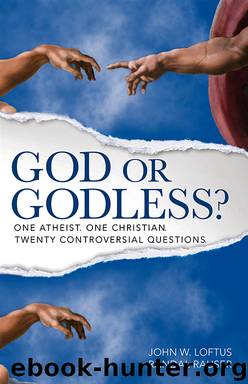God or Godless by John W. Loftus

Author:John W. Loftus
Language: eng
Format: mobi, epub
Tags: REL067030
ISBN: 9781441240699
Publisher: Baker Publishing Group
Published: 0101-01-01T00:00:00+00:00
John’s Opening Statement
There are some things I know without much doubt at all. The most certain thing I know is the cogito of René Descartes: “I think therefore I am.” Could I be wrong and not really exist? I doubt it. And as long as I doubt it there is someone doing the doubting—me. There are other things I know; for instance, I know I’m typing these words and drinking some coffee while I do. (Ahhh, that tasted good.) I have no reason at all to doubt my senses and the personal experiences I’m presently having. They are incorrigible to me. Do I have faith that my coffee tastes good? No, I personally sense that it tastes good. There are other things I know without too much doubt—things too many to even list—and they are all based on solid empirical evidence along with good reasons for thinking them to be so. The more evidence and reasons there are for what I think is the case, then the more I can claim them to be the case.
When it comes to faith, there are at least two ways to understand it. First, faith as hopeful, wishful thinking, motivates us to achieve great things. It helps us win the love and affection of a lover, a sports contest, or an important award. Sometimes we must maintain it in the face of all odds; otherwise we may quit trying. This kind of faith is like a self-fulfilling prophecy. But it cannot make something come true that doesn’t involve our actions. Many things are simply beyond our control. Faith can’t make it true that Jesus arose from the dead. He either did or he didn’t. Faith will not change these kind of facts. So when faith is used to make facts true that it cannot make true, I think faith is pretty much irrational. Wishful thinking about facts we cannot make true is not what thinking adults should do.
Faith in the second sense is always a leap beyond the probabilities, for if something is highly probable then I don’t believe it to be true. I know it to be true by the degree of probability it has. We need to think exclusively in terms of probabilities and not try to add faith to them since faith doesn’t add anything at all. If we did this, all that would matter would be the probabilities. There would be no need for faith. Faith in this sense means someone is accepting an improbable conclusion. So I eschew faith-based reasoning entirely and instead embrace science-based reasoning. I may be wrong in how I assess the probabilities, but I can never go against them.
Having said this, I do agree that almost everybody has faith, but this isn’t a good thing. Rather, it’s a problem to be overcome. According to Michael Shermer, “The brain is a belief engine.”
We form our beliefs for a wide variety of subjective, personal, emotional, and psychological reasons in the context of environments created by family, friends,
Download
This site does not store any files on its server. We only index and link to content provided by other sites. Please contact the content providers to delete copyright contents if any and email us, we'll remove relevant links or contents immediately.
The Secret Power of Speaking God's Word by Joyce Meyer(3220)
Signature in the Cell: DNA and the Evidence for Intelligent Design by Stephen C. Meyer(3138)
Real Sex by Lauren F. Winner(3023)
The Holy Spirit by Billy Graham(2952)
The Gnostic Gospels by Pagels Elaine(2531)
Jesus by Paul Johnson(2362)
Devil, The by Almond Philip C(2331)
23:27 by H. L. Roberts(2251)
The Nativity by Geza Vermes(2230)
Chosen by God by R. C. Sproul(2164)
All Things New by John Eldredge(2162)
Angels of God: The Bible, the Church and the Heavenly Hosts by Mike Aquilina(1969)
The Return of the Gods by Erich von Daniken(1945)
Angels by Billy Graham(1926)
Knowing God by J.I. Packer(1858)
Jesus of Nazareth by Joseph Ratzinger(1811)
The Gnostic Gospel of St. Thomas by Tau Malachi(1798)
Evidence of the Afterlife by Jeffrey Long(1790)
How To Be Born Again by Billy Graham(1782)
